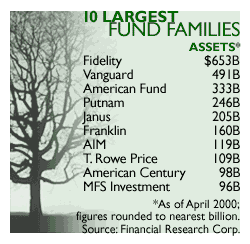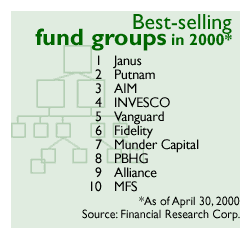|
Fund family lowdown
|
 |
June 8, 2000: 11:16 a.m. ET
What to know before you place your trust -- and money -- with a company's funds
By Staff Writer Jeanne Sahadi
|
NEW YORK (CNNfn) - There are nearly 600 mutual fund families to invest with, and together they offer more than 11,000 funds. But before you decide which funds are right for you, it pays to know about the companies that run them.
The differences among the fund families can break down in countless ways.
There are big houses such as Putnam and small ones such as Heritage; one-stop shops such as Fidelity and one-investment-style boutiques such as the Internet-focused Jacob Asset Management. Some may offer financial services or annuities while others don't. Many are available at fund supermarkets, but some can only be accessed through an investment adviser. And then, of course, there are key differences in performance, management and expenses.
However you look at it, selecting the best firms and funds for your money requires some research on your part, and a little help from the experts.
Things to avoid
In general, there are a couple of ways to separate the best from the mediocre from the downright awful.
For starters, try to avoid fund families that have one good fund and no others. "That's a risky proposition," said Christine Benz, an analyst with fund-tracker Morningstar.
And, of course, fund houses whose expenses exceed that of their peers can be crossed off your list immediately.
Steer clear, too, of a company in which there is high turnover among its portfolio managers or a tendency to shift investment styles frequently, Benz said.
Go with a crack team
Indeed, retaining talent, which doesn't necessarily mean big names, is key to a fund company's success.
 While a big firm with a lot of money is more likely to have a deep research bench and top managers, that's not always the case. And it doesn't mean smaller firms can't compete. While a big firm with a lot of money is more likely to have a deep research bench and top managers, that's not always the case. And it doesn't mean smaller firms can't compete.
Take Oakmark, which specializes in value investing. "Their research is exceptional," Benz said.
Good incentive programs for managers are what New York City-based certified financial planner Gary Ambrose always looks for in a fund family.
Benz noted that in some of the smaller firms, which may have 10 or fewer funds and possibly only a few hundred million in assets, managers are sometimes given ownership stakes in the company. That's something bigger houses may not be able to offer as generously, if at all, but the tradeoff is that larger firms can provide prestige and advancement.
Don't limit yourself
No planner recommends you stick with just one family.
"We don't think any one fund company has all the best choices," said Petaluma, Calif.-based CFP Paula Wiiken.
Indeed, you might do quite well pulling together a portfolio from those companies that are known to excel in one or more areas of investment, Benz said.
Big names such as Fidelity, Vanguard, T. Rowe Price and Putnam are among the families she recommends for core blend holdings, or what she describes as "growth at a reasonable price." But she also identified Janus, RS, Invesco and AIM for their strong growth focus.
Among value leaders, she counts Oakmark, Weitz, Gabelli and Longleaf; and she cited Pimco and Vanguard for their fixed income funds. American, Scudder Kemper and Templeton, meanwhile, are among the fund companies highly regarded for their international offerings.
If you stay in one family
If, however, you find it easier to stay within one firm, make sure to choose one that provides a full plate of funds that span the spectrum of investment objectives, mutual fund consultant Burt Greenwald advised. That means growth and value equity funds of the large-, mid- and small-cap variety; fixed income funds and a choice of index and sector funds, as well as international exposure.
Also, make sure the majority of those funds are solid performers relative to their peers. "If those funds have a good, long-term record, you can stay within a fund family," Greenwald said.
If Wiiken had to choose, she would go with Fidelity, a company best known for its one-stop shopping approach. For socially responsible investors, she recommends Citizens funds for their breadth and solid performance.
Look for marathon runners, not sprinters
Two of the biggest characteristics that distinguish one fund family from the next are history and performance over time.
Greenwald looks at how long a fund company has been in business -- 10 years or more is his preferred benchmark. And he likes when a company's funds have strong, long-term growth in assets.
 Above all, Ambrose said, "You want to work with a family that has a good long-term track record." Above all, Ambrose said, "You want to work with a family that has a good long-term track record."
Greenwald cautions against basing your investment decisions on a list of funds that did well in the past year or two. "Don't be seduced by short-term performance," he said.
Instead, he suggested, choosing funds from a family whose offerings not only meet your asset allocation needs, but also consistently rank in the top 25 percent to 50 percent of their peers.
But beware of volatility, he said. A fund may beat out the majority of its asset class over a three-to-five-year stretch, but if that high ranking was earned on the basis of one year's stellar performance, the fund's long-term prospects may be rocky.
Reward innovation ... sometimes
If you're tempted by a new offering that promises to take advantage of the latest investment trend, look twice.
Most experts advise you hold off until the company has proven expertise in the area where the fund will be investing.
"You don't want to pick a family that just created a fund they don't have a history in," Ambrose said.
On the other hand, if the fund family does have a good track record in a given sector, getting into one of its new offerings might pay off, Ambrose noted. The new fund's asset base likely will be smaller than its peers, giving the portfolio manager greater flexibility in his or her investments, he said.
Take a measure of cost ... and philosophy
To Scott Leonard's way of thinking, a fund family should have not only great history and performance, but also offer value for low cost.
"I want an inexpensive place for my money," said Leonard, an El Segundo, Calif.-based CFP and a big proponent of passive over active management.
With passive investing, he noted, the individual manager matters less than the family's style and philosophy governing management.
"You're not looking for the next Peter Lynch," he said.
But what you should look for is consistency in how a family manages its funds, he added. Without that, a company may be more likely to create products for the sole purpose of selling them, rather than providing true value for investors.
That's why he counts Vanguard as one of his favorites. It is by no means immune to the seductions of marketing, he said, but he applauds the company's consistent investment philosophy, which includes a commitment to low expenses, indexing and broad diversification.
Can't decide? Get help
One of the easiest ways to sort out which fund families will work for you is to consult with a financial planner or consultant whose job it is to follow the best companies in the industry and recommend those that fit with their clients' needs.
"Most people could benefit from the help of some sort of trained adviser," Greenwald said, noting all the information about mutual fund investing that is now available may "do more to confuse than help."
After all, he said, "You can't do this the same way you rate restaurants." 
|
|
|
|
|
 |

|

